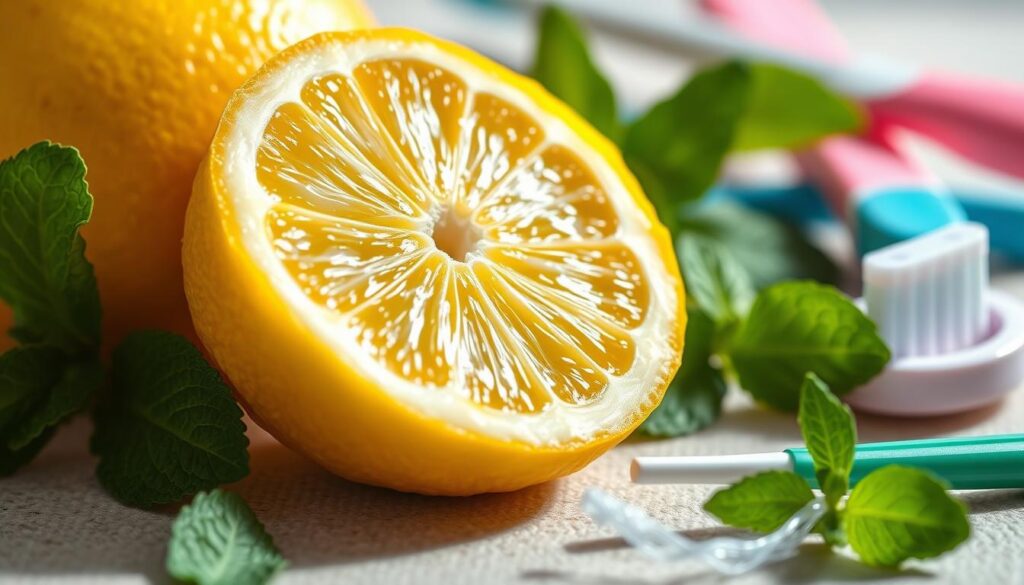The lemon peel is often ignored, but it’s full of health benefits. While we use the lemon’s juice and pulp a lot, the peel has its own set of nutrients. These can really help your health. So, is the skin of lemon good for you? You might be surprised by the answer.
Key Takeaways
- Lemon peel is a rich source of fiber, vitamins, and antioxidants like vitamin C and D-limonene.
- The peel may help improve oral health, support the immune system, and even possess anticancer properties.
- Lemon peel has been linked to lower cholesterol, blood pressure, and blood sugar levels.
- The peel may aid in the treatment of gallstones and have antimicrobial qualities.
- Lemon peel is generally recognized as safe for consumption by the FDA.
Nutritional Value of Lemon Peel
Packed with Fiber, Vitamins, and Minerals
Lemon peels are surprisingly nutritious, even though we eat them in small amounts. A tablespoon of lemon peel has only 3 calories but is rich in nutrients. It has 1 gram of carbs, 1 gram of fiber, and 9% of the Daily Value for vitamin C.
Lemon peels also have calcium, potassium, and magnesium. These nutrients are important for our health.
The smell of lemons comes from a compound called d-limonene. This compound is found in the peel and is thought to have many health benefits.
| Nutrient | Amount per Tablespoon (6 grams) | % Daily Value |
|---|---|---|
| Calories | 3 | – |
| Carbohydrates | 1 g | – |
| Fiber | 1 g | 4% |
| Vitamin C | 5.4 mg | 9% |
| Calcium | 5 mg | 0.5% |
| Potassium | 11 mg | 0.3% |
| Magnesium | 1 mg | 0.2% |
The lemon peel benefits, lemon zest nutrition, and lemon rind health come from its nutrients. It’s full of fiber, vitamins, and minerals. This part of the lemon is a nutritional powerhouse.

Oral Health Benefits
Lemon peel is full of nutrients and great for your mouth. It has antibacterial stuff that fights off bad germs in your mouth. This can help prevent common mouth diseases.
Studies show lemon peel has four strong antibacterial compounds. They fight bacteria that cause tooth decay and gum disease. Another study found lemon peel extract really cuts down on Streptococcus mutans, a big cause of cavities.
The vitamin C in lemon peel helps stop gingivitis and bleeding gums. The pectin in it might help you lose weight. This could help your mouth by making you less likely to get tooth decay from sugar.
| Nutrient | Benefit |
|---|---|
| Vitamin C | Prevents gingivitis and bleeding gums |
| Pectin | Aids in weight loss by increasing feelings of fullness |
| Antibacterial compounds | Inhibit growth of oral disease-causing microorganisms |
But, drinking lemon water and other citrus drinks should be in small amounts. Too much can hurt your tooth enamel. Doctors say to mix lemon juice with water, avoid sugar, and wait a bit before brushing your teeth.

Antioxidant Properties
Lemon peel is full of antioxidants, which are great for your health. It has D-limonene, a compound that may lower the risk of heart disease and type 2 diabetes. A study showed lemon peel is more antioxidant-rich than grapefruit or tangerine peels.
Studies on animals found D-limonene boosts an enzyme that fights oxidative stress. This stress can cause tissue damage and aging. So, adding lemon peel to your diet is key for its antioxidant benefits.
Rich in Antioxidants Like D-Limonene
Lemon peel is loaded with antioxidants like vitamin C, flavonoids, and polyphenols. These work together to fight off harmful free radicals. In fact, lemon peel’s polyphenols are better at this than vitamin C.
Research on lemon peel’s antioxidants is impressive. A study found its polyphenols can protect cells from oxidative stress. This shows lemon peel is a natural antioxidant powerhouse.

Lemon peel also has gallic acid, neochlorogenic acid, and (+)-catechin. These add to its antioxidant power. Including lemon peel in your diet can help keep you healthy and well.
Is the skin of lemon good for you?
The humble lemon peel is often overlooked, but it’s actually a powerhouse of nutrients and health benefits. Contrary to common belief, the skin of the lemon is not only edible but also highly beneficial for your well-being.
Lemon peels contain five to 10 times more vitamins than the lemon juice itself. They are packed with fiber, vitamins, and minerals that can support various aspects of your health, from oral hygiene to immune function and heart health.
- Lemon peels are rich in antioxidants like salvestrol Q40 and limonene, which can help eliminate waste from the body and protect against cellular damage.
- Flavonoids in lemon peels are effective in curbing the division of cancerous cells, potentially offering anticancer properties.
- Studies suggest that consuming lemon peels can help prevent osteoporosis, rheumatoid arthritis, and other bone conditions.
But the benefits of lemon peel don’t stop there. The polyphenol flavonoids in lemon peels can also help lower LDL cholesterol levels, while the vitamins present may aid in preventing high blood pressure and heart disease.
So, the next time you reach for a lemon, don’t discard the peel – use it to your advantage. Explore the edible lemon peel uses and enjoy the is the skin of lemon good for you benefits that this versatile citrus fruit has to offer.

“Lemon water in the morning on an empty stomach can help balance the body by inducing a more alkaline state.”
Antimicrobial and Antifungal Properties
The benefits of lemon peel go beyond just being nutritious. Research shows that citrus fruit skin might have strong antimicrobial and antifungal properties. A study found that lemon peel can stop the growth of bacteria that are resistant to antibiotics. Another study showed that lemon peel extract works against a fungus that causes skin infections and is hard to treat.
This is good news because edible lemon peel could be a natural way to fight microbial and fungal infections. But, we need more studies on humans to really understand how well it works.

The antimicrobial activity of citrus peels comes from compounds like flavonoids and essential oils. These compounds can damage the cell membranes of harmful microbes and mess with their metabolism.
“Lemon peel has shown promising antimicrobial and antifungal properties in laboratory studies, but more research is needed to confirm its effectiveness in real-world applications.”
The idea of lemon peel benefits is exciting, but we should be careful when using citrus fruit skin on our skin. Using it wrong or being sensitive to its acid can cause skin irritation, dryness, or photosensitivity. Always talk to a doctor before adding edible lemon peel to your routine.
Immune System Boosting Benefits
Lemon peel is a powerhouse for a healthy immune system. It’s full of flavonoids and vitamin C. These help strengthen the body’s defenses.
Research shows lemon peel extract boosts immune responses. A 15-day study on fish fed dehydrated lemon peel showed better immune function. This is thanks to the peel’s antioxidants, especially vitamin C.
Lemons are a great source of vitamin C. One cup of lemon slices gives you nearly 6 grams of fiber. This is good for your gut bacteria. Since only 5 percent of Americans get enough fiber, adding lemon peel is a simple way to boost immunity and gut health.
“Vitamin C is a natural immune booster,” notes a 2023 review in Pharmaceuticals. “Consuming 1 cup of sliced strawberries delivers 100% of the daily value for vitamin C, equivalent to 90 milligrams.”
Looking to fight off colds or just boost your immunity? Try adding lemon peel to your food and drinks. It’s packed with nutrients that support a healthy lifestyle.
Heart Health Benefits
Lemon peel is not just tasty in food, but it’s also great for your heart. It’s full of flavonoids, vitamin C, and pectin. These help lower cholesterol and reduce heart disease risks.
A study with 344,488 people showed a 5% heart disease risk drop with 10 mg more flavonoids daily. Another study with 60 kids showed lemon peel powder lowered blood pressure and LDL (bad) cholesterol in 4 weeks.
Lowering Cholesterol and Blood Pressure
The pectin fiber in lemon peel helps remove cholesterol from the blood. It also lowers plasma cholesterol levels. Plus, lemon peel’s potassium helps control blood pressure, which is crucial for heart health.
| Nutrient | Benefit to Heart Health |
|---|---|
| Flavonoids | Reduce risk of heart disease by 5% for every 10 mg increase per day |
| Vitamin C | Helps reduce the risk of stroke and cardiovascular disease |
| Pectin | Binds to cholesterol and helps lower plasma |
| Potassium | Regulates blood pressure, a key factor in maintaining heart health |
Lemon peel is packed with nutrients that are good for your heart. Adding it to your diet can help keep your heart healthy. It’s a simple way to support your heart’s well-being.
Potential Anticancer Properties
Research is showing that lemon peel benefits might go beyond just being a good source of nutrients. The lemon skin antioxidants in the peel could have strong anticancer effects. This makes lemon peel a possible help in fighting cancer.
Studies show that lemon peel’s flavonoids may lower cancer risk. Vitamin C in lemon peel boosts the immune system. It helps grow white blood cells that fight cancer cells. Also, d-limonene in lemon peel has shown to fight stomach cancer.
A study found d-limonene kills stomach cancer cells. Another study in rats showed d-limonene stops stomach cancer by killing cancer cells faster.
Even though lemon peel’s anticancer effects look promising, more human studies are needed. But, adding lemon peel to your diet is worth looking into.
| Compound | Potential Anticancer Effects |
|---|---|
| Flavonoids | Reduced risk of several types of cancer |
| Vitamin C | Boosts immune system, promotes elimination of mutated cancer cells |
| d-Limonene | Demonstrated anticancer effects, particularly against stomach cancer |
“Lemons are claimed to be 10,000 times stronger than chemotherapy according to a widely circulating email. However, this claim has been debunked as false.”
Gallstone Treatment
Gallstones are hard deposits in the gallbladder. They can cause pain, nausea, and vomiting if they block a duct. Most people get their gallbladder removed to treat this. But, some try gallbladder cleanses as an alternative.
Gallbladder cleanses use lemon juice, olive oil, apple juice, and vegetable juice. They are thought to be a natural way to reduce gallstones. Yet, there’s little scientific proof they work well. A 2009 review found little evidence supporting their use.
Some natural remedies, like dandelion products and traditional Chinese medicines, might help with gallstones. But, we need more research to be sure. Acupuncture can also help with gallbladder inflammation symptoms.
But, gallbladder cleanses can cause side effects like diarrhea and nausea. Always talk to a doctor before trying them. Surgery, like cholecystectomy, is the best way to treat gallstones and prevent them from coming back.
In summary, natural remedies might help with gallstones, but we need more proof. Always talk to a doctor before trying any new treatments. Eating well and avoiding quick weight loss can also help prevent gallstones.
| Treatment Option | Effectiveness | Potential Risks |
|---|---|---|
| Gallbladder Cleanse | Limited scientific evidence, largely based on anecdotal reports | Diarrhea, nausea, vomiting |
| Dandelion Products | Potential benefits, but more research needed | May interact with certain medications |
| Traditional Chinese Medicines | Potential benefits, but more research needed | May interact with certain medications |
| Acupuncture | May provide relief for gallbladder inflammation symptoms | Generally considered safe, but rare side effects possible |
| Cholecystectomy (Gallbladder Removal) | Most effective treatment, prevents gallstone reformation | Surgical risks, such as infection and bleeding |
Some people look for alternative treatments for gallstones. But, always talk to a doctor before trying anything new. Eating well and staying healthy can help prevent gallstones. For those who need treatment, removing the gallbladder is the best option.
Other Uses of Lemon Peel
Lemon peel is more than just a kitchen ingredient. It’s great for cleaning and personal care too. Let’s look at some edible lemon peel uses and other uses of lemon peel that make life easier and healthier.
One top use is as a natural cleaner. Mix lemon peels with vinegar to clean your kitchen and more. It’s also great for freshening up your fridge and trash cans.
Want to make your stainless steel appliances shine? Rub lemon peel on them. It removes spots and smudges, leaving them looking new.
Coffee lovers, take note. Lemon peel can clean your coffee pot. It gets rid of coffee stains and mineral deposits, making your coffee maker work better.
Lemon peels can also keep bugs away. Boil them, cool the water, and mix with soap. This spray keeps bugs off your plants.
In the kitchen, lemon peels are versatile. You can candy, dehydrate, or freeze them for later. They’re also good for making vodka or unique cocktail garnishes.
Lemon peel is a smart choice for cleaning, freshening, and flavoring. It’s a sustainable and creative solution for your daily needs.
Conclusion
The skin of a lemon is often thrown away, but it’s full of health benefits. It’s packed with fiber, vitamins, and antioxidants. These can help your mouth, boost your immune system, and even protect your heart.
Lemon peel might even fight cancer. This is amazing.
When you make lemon-infused dishes, don’t throw away the peel. Adding lemon peel to your daily life can do many good things. It can make your skin brighter, help control oil, and make your hair stronger.
Lemon peel is not just good for you; it’s full of nutrients. By using lemon peel, you can improve your health in many ways.
So, is lemon skin good for you? Absolutely yes. It’s not only safe to eat but also full of health benefits. Using lemon peel can greatly improve your overall health.





